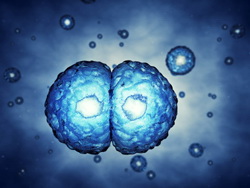Dissecting the links between cancer and microtubulemalfunction
Accurate chromosome segregation strongly depends upon correct microtubule organisation in mitosis by centrosomal and acentrosomal microtubule organising centres (MTOCs). Malfunctions in the formation and regulation of MTOCs are strongly associated with cancer development. Consequently, centrosomes and proteins involved are putative targets for anti-mitotic cancer drugs. Despite these observations, the molecular details of the function of MTOCs are still poorly understood. The EU project 'Microtubule organizing centres and microtubule nucleation in mitosis' (MTOC Function) is focusing on the study of the key component of MTOCs, the cytoplasmic tubulin ring complex (TuRC). The primary goal is to better understand how MTOCs are formed and regulated, and how they contribute to proper microtubule organisation. The answer to these questions will enlighten the molecular basis of defects that lead to the cancer phenotype. MTOC Function researchers utilised a multidisciplinary approach combining molecular biology, biochemistry and mass spectrometry-based proteomics. Protein mapping and comparative analysis of whole protein mixtures from non-synchronised and mitotic human cells were performed. These analyses characterised the composition and the interacting proteins of TuRC. Novel, core and transient subunits of TuRCs were identified associated with specific cell phases, such as the GCP8/MOZART2 (interphase and mitosis), and the augmin complex (mitosis). Further targeted studies on these proteins shed more light on their function in the organisation and regulation of the microtubule network. The results are being used to develop a proposed model in which the formation of mitotic centrosomes is regulated by multiple protein phosphorylation events by mitotic kinase polo-like kinase 1 (Plk1). In addition, preliminary results as well as published data, showed an interplay of centrosomal and acentrosomal microtubule nucleation, which is currently under deeper investigation. Project work has established the basic tools and knowledge for detailed analyses of the roles of proteins involved in microtubule organisation, in both interphase and mitosis. Such investigation will provide valuable insights into the molecular basis of the cancer phenotype and possibly several other human diseases (e.g. Parkinson's and Alzheimer's).







